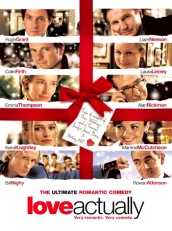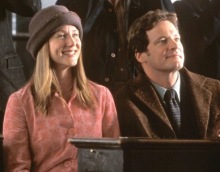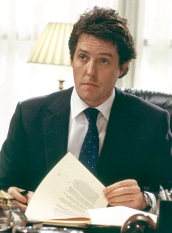| Love Actually |
| |
 |
USA, 2003. Rated R. 128 minutes.
Principal Cast:
Hugh Grant, Colin Firth, Emma Thompson, Liam Neeson, Laura Linney, Alan
Rickman, Bill Nighy, Keira Knightley, Martine McCutcheon, Andrew Lincoln,
Thomas Sangster, Lúcia Moniz, Martin Freeman, Joanna Page, Heike Makatsch,
Kris Marshall, Rodrigo Santoro, Chiwetel Ejiofor, Olivia Olson
Cameos: Billy Bob Thornton, Rowan Atkinson, Claudia Schiffer, Denise
Richards, Shannon Elizabeth, Elisha Cuthbert, January Jones, Ivana Milicevic
Writer: Richard Curtis
Original Music: Craig Armstrong
Cinematography: Michael Coulter
Producers: Tim Bevan, Eric Fellner, Duncan Kenworthy
Director: Richard Curtis
LINKS
|
 adies
and gentlemen, it's official. Richard Curtis has become a movie franchise. The
trailer for his latest screenwriting effort and directorial debut, Love Actually,
features as many scenes from his previous films as it does from Love Actually.
Of course, when your writer/director also wrote Four Weddings and a Funeral,
Notting Hill, and Bridget Jones's
Diary, three of the best romantic comedies of the past ten years, it
makes sense to market that. (Oddly, though, they neglected to mention the Curtis-written
The Tall Guy (1990).)
adies
and gentlemen, it's official. Richard Curtis has become a movie franchise. The
trailer for his latest screenwriting effort and directorial debut, Love Actually,
features as many scenes from his previous films as it does from Love Actually.
Of course, when your writer/director also wrote Four Weddings and a Funeral,
Notting Hill, and Bridget Jones's
Diary, three of the best romantic comedies of the past ten years, it
makes sense to market that. (Oddly, though, they neglected to mention the Curtis-written
The Tall Guy (1990).)
Admittedly, Four Weddings and a Funeral, Notting Hill, and Bridget
Jones's Diary have a certain sameness about them. Populated by nervously
self-conscious characters, they share that self-deprecating brand of verbal
British humor that is almost nowhere to be found in American films. And, of
course, they share Hugh Grant. Nonetheless, there's something wonderful about
a sharply written comedy that roots for intelligent, self-aware characters whose
personal foibles are ones that most of us identify with. Curtis's films stand
up to repeated viewings, a rare thing in a genre so dependent on the fresh and
unexpected to generate laughs. The movies may all be variations on a theme,
but as long as the best romantic comedies Hollywood can offer are sweet but
humdrum farces like Shallow Hall or unresonant gimmick-concept films
like Kate & Leopold, Curtis can keep 'em coming.

Laura Linney and Colin Firth attend a wedding in Love Actually.
|
Curtis offers more sugar-sweet romance in Love Actually, but he attempts
something far more ambitious that usual with his narrative structure. Instead
of focusing on the struggle of a single protagonist to find love, Curtis has
attempted to weave multiple story lines involving enough characters to shame
a Robert Altman film. A summary (follow along if you can): With her friend Jamie
(Colin Firth), who is about to go to southern France and fall in love with his
non-English-speaking housekeeper Aurelia (Lúcia Moniz), Sarah (Laura Linney)
attends the wedding of Juliet (Kiera Knightley) and Peter (Chiwetel Ejiofor),
whose best man Mark (Andrew Lincoln) is in love with Juliet. Sarah has her own
unrequited crush on a co-worker, Karl (Rodrigo Santoro), and is encouraged to
pursue him by her boss Harry (Alan Rickman), who is discombobulated by the advances
of his secretary Mia (Heike Makatsch) because he is married to Karen (Emma Thompson),
who has been attempting to comfort her friend Daniel (Liam Neeson) over the
loss of his wife, though Daniel must set aside his grief in order to help his
eleven-year-old Sam (Thomas Sangster) cope with his painful crush on dazzling
classmate Joanna (Olivia Olson). Meanwhile, aging rocker Billy Mack (Bill Nighy)
tries to score one last number one hit by recycling one of his oldies as a Christmas
song; John (Martin Freeman) and Judy (Joanna Page) shyly get to know each another
while working as nude body doubles on a film set; homely Colin (Kris Marshall)
is dead-set on moving to a wonderful place called Wisconsin where all the women
are gorgeous; and the Prime Minister of the United Kingdom (Hugh Grant) is attracted
to one of his secretaries, Natalie (Martine McCutcheon), who is thought by others
to be overweight.

Prime Minister Hugh Grant in Love Actually. |
Got it?
No? Well, in practice the plot turns out to be less of a Gordian knot than
it sounds. Still, with this many story lines, they're not all going to work,
and inevitably they are all going to be a bit shallow. Had Curtis reduced the
number of characters slightly, he would have been able to devote more screen
time to character development. Fortunately, Curtis is good at defining the essence
of his characters' personalities, insecurities, and desires with just a few
strokes of the brush. The outstanding cast is a huge asset in this regard. Mammoth
talents like Rickman, Thompson, Neeson, Linney, and Firth do not need a lot
of screen time to communicate who they are. Meanwhile, Nighy nearly steals the
film with his antics ("so if you believe in the spirit of Christmas, children,
buy my festering turd of a record").
Emotionally, the Prime Minister's storyline resonates the least, despite the
valiant efforts of the always-appealing Hugh Grant (without whom the subplot
would have foundered utterly). His crush on Natalie comes from nowhere—late
in the film, Curtis belatedly justifies it on the grounds that she is "his type"—and
his character appears to have been made Prime Minister for the sole purpose
of shoehorning in a rousing speech calling for greater British independence
from U.S. foreign policy. It's a memorable speech, but regardless of whether
you agree or disagree, the political statement doesn't really belong in the
film. Fortunately, it doesn't stick out as a horrible misstep, because it fits
with the theme of underdogs standing up for themselves and saying, "Hey, I think
I deserve better than this."
Curtis' minor mistakes are easily forgivable in such a funny and often touching
film. Who else would think of having one character ask another on a date while
they're rehearsing a simulated blowjob, putting lobsters in nativity plays,
or playing the Bay City Rollers during a memorial service. Love Actually
isn't just one of those "isn't love great?" movies. While you're laughing, you
can genuinely feel the characters' profound yearning to connect substantively
with one another. That's the magic of Curtis: in addition to writing very witty,
uniquely British dialogue, he makes universal desires individual and individual
desires universal. All of the story lines are funny, even the throwaway one
involving Colin, which would have been the easiest to cut. The characters don't
all get happy endings, either, which introduces an unexpected bit of bittersweet
complexity that causes the film to linger in your mind longer than the average
puffball rom-com.
Curtis continues to find new twists on old romantic comedy stand-bys, such
as the Mad Rush to the Airport to Catch the Girl in the Nick of Time. You know
you're in for that one right from the beginning, when Hugh Grant (in voiceover)
talks about how love is everywhere at the arrivals gate at Heathrow Airport.
It doesn't matter. Curtis knows it's corny, and he knows we know it's corny,
but he's going to be corny anyway, and have some fun in the process, because
you know what? Curtis is on to us. This cornball stuff is what we all secretly
want, so as long as he can keep finding ways of making it funny, he'll keep
writing it, and we'll keep laughing.
Review
© November 2003 by AboutFilm.Com and the author.
Images © 2003 Universal Studios. All Rights Reserved.



